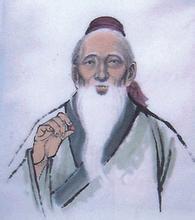(单词翻译:单击)
Hua Tuo(145~208), famous physician of the late Eastern Han Dynasty, also named Fu, was born at Qiao County in Peiguo(now Bo Zhou, Anhui Province). His courtesy name was Yuanhua and the dates of his birth and death still remain unaccountable.
华佗(145~208 ) ,字元化,又名敷,沛国谯(今安徽毫州市)人,东汉末年医学家。
He led a simple life, away from fame and fortune. He would rather become a traveling physician for ordinary people, who in turn held him in great reverence.
华佗淡于名利,不慕富贵,宁愿做民间医生,为人民解除疾苦,足迹遍及安徽、山东、河南、江苏等地,声名卓著,深受人民爱戴。

Hua Tuo was an expert in several medical fields, such as internal medicine, surgery, gynecology, pediatrics and acupuncture. He was the first person to perform surgery with the aid of anesthesia (by applying Ma Fei San, a herbal anesthetic he invented) some 1 600 years before Europeans did.
华佗精通内、外、妇、儿、针灸各科,对医学的突出贡献是创用麻沸散,是药物麻醉的先驱者,西医用麻醉药至少比华佗晚1600年。
His expertised in surgical operation earned him the title of Father of Chinese Surgery.
华佗精于外科手术,是外科学的鼻祖。
He pointed out that physical exercises helped to promote health, so working out could accelerate people's inner circulation and prevent them from suffering diseases, just like a working door hinge will never rot away.
指出了运动促进健康和预防疾病的积极作用,“血脉流通,病不得生,譬如户枢,终不朽也”。
With this principle, he invented a set of physical exercises called “Wu Qin Xi" (Frolics of Five Animals), in which one imitates the actions of tigers, deer, bears, apes, and birds to promote health.
为此,华佗根据古代的导引方法编创了种新的运动方法“五禽戏”,模仿虎、鹿、熊、猿、鸟五种动物的各种姿态来锻炼身体。
He was good at diagnosis by observing the patients' facial complexion and feeling their pulse, proficient in acupuncture and in understanding the properties of medicines. He also practiced psychological therapies to cure chronic illnesses.
华佗善于通过观察病人的面目颜色来诊断,善于脉诊,深明药性,对病人的心理也颇有研究,曾用来治疗痼疾。
Unfortunately, almost all of his medical works, such as Hua Tuo Fang (Hua Tuo's Prescriptions), Hua Tuo Nei Shi (Hua Tuo on lnternal Medicine) and Zhen Zhong Jiu Ci Jing (The methods of Using Acupuncture and Moxibustion) were lost.
华佗一生的著作有《华佗方》、《华佗内事》、《枕中灸刺经》等,可惜均已散失。


